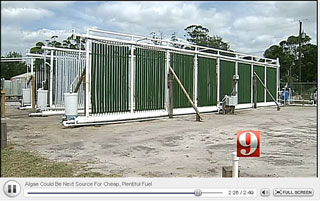BrevardBioDiesel Blog
Archives for: May 2008
Mexico: farmacia-mexico.com
türk dükkan online
05/28/08
Brevard firm showing algae (for biodiesel) reactors

XL Techgroups's (of Melbourne, FL) company PetroAlgae has been showing their Fellsmere located algae photo-bio-reactor (PBR) system to the media this month. Orlando TV station WFTV does a good job of covering the facility. At production rates of 10,000 - 40,000 gallons per acre the company hopes to "roll out the technology worldwide by 2009" according to the report.
Some scientists are skeptical of the cost effectiveness of a closed PBR system, and are concentrating on cheaper-per-acre open ponds for algae growth instead. Either way, CO2-eating algae would be a wonderful alternative to exhuming dinosaur juice to fuel our vehicles.
05/01/08
WESH reports on UCF student biodiesel home-brewers
Orlando NBC station WESH has a report and video segment online detailing the work of a group of UCF students  that are converting used Chick-fil-A grease into biodiesel via an Appleseed processor.
that are converting used Chick-fil-A grease into biodiesel via an Appleseed processor. The students also donate 20% of their processed fuel to the university for their use in dozens of on-campus diesel vehicles. The story notes the requirement to pay Florida state fuel taxes on home-brewed biodiesel. Overall a pretty accurate report.
The students also donate 20% of their processed fuel to the university for their use in dozens of on-campus diesel vehicles. The story notes the requirement to pay Florida state fuel taxes on home-brewed biodiesel. Overall a pretty accurate report.
Example of content:
They have been draining smelly fryer grease and feeding it to their bio-diesel reactor -- a fancy name for a water heater, some pipes, valves, hoses, and filters that turn grease and two household chemicals into fuel. The newly formed fuel powers their diesel engine cars.
"To make a gallon of bio-diesel, it's about 80 cents," UCF student Michael Schulist said.
Not only cheap, the muddy looking bio-diesel burns cleaner than its petroleum-based cousin.
"Petro-diesel is a very dirty fuel. This is a very clean burning fuel," Schulist said.
It produces less CO2 -- the main threat to our climate -- than gasoline or regular diesel.
"It would limit the amount of pollution we put into the air but it would also save a lot of money," UCF assistant professor Ali Gordon said.

| Mon | Tue | Wed | Thu | Fri | Sat | Sun |
|---|---|---|---|---|---|---|
| << < | > >> | |||||
| 1 | 2 | 3 | 4 | |||
| 5 | 6 | 7 | 8 | 9 | 10 | 11 |
| 12 | 13 | 14 | 15 | 16 | 17 | 18 |
| 19 | 20 | 21 | 22 | 23 | 24 | 25 |
| 26 | 27 | 28 | 29 | 30 | 31 | |
Search
Categories
Archives
- October 2012 (1)
- August 2012 (1)
- May 2012 (1)
- April 2012 (1)
- December 2011 (1)
- May 2011 (1)
- March 2011 (1)
- February 2011 (1)
- January 2011 (1)
- August 2010 (1)
- July 2010 (1)
- March 2010 (1)
- more...
Linkblog
Biodiesel Info
- B100 Biz Yahoo Group
Biofuel businesses

- Biodiesel Now Great forums

- Biodiesel Yahoo Group
Very active

- Collaborative Biodiesel Tutorial
Simple homebrewing info

- Energy Self-Sufficiency Newsletter
Free monthly pub.

- Infopop Biodiesel/SVO Forum
Great forum

- ISU Biodiesel
Papers, free online course

- Lots of links
Best collection of BD/VO links

- National BioDiesel Board Official site

- TDIClub VW forums




